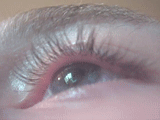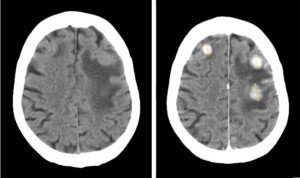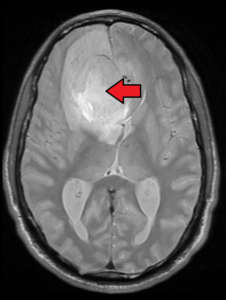A brain tumor can cause an eyelid to droop, but the big question is: Can a brain tumor cause an eyelid to twitch?
Many people who have a persistently twitching eyelid are terrified that this is being caused by a brain tumor.
“Eyelid twitching is very common and is usually benign, but can be serious in rare cases,” begins Kaushal M. Kulkarni, MD, board certified ophthalmologist and neuro-ophthalmologist in private practice in New York.
Usually, when an eyelid twitches, there’s something going on with the tiny muscles of the eyelid.

Credit: Leitz31337 at English Wikipedia
These very tiny muscles are contracting—and this is what you feel and see as the twitching (fasciculations).
Do not confuse a twitching eyelid with a drooping one.
There are many causes of the drooping, which is called ptosis. One is a brain tumor.
So you’re probably wondering, “If a brain tumor can cause an eyelid to droop, can it also cause the eyelid to twitch?”
Is the Twitching in just One Eyelid?
Dr. Kulkarni explains, “Intermittent eyelid twitching or fluttering in just one eyelid, which comes and goes, is very common and usually due to a benign condition called eyelid myokymia.”
Myokymia is the medical term for harmless muscle twitching on a very small scale.
“It is commonly brought on by stress, lack of sleep or caffeine,” says Dr. Kulkarni. Sometimes, an eyelid twitches for no real reason.
“However, if the twitching involves more than just the eyelid and involves the head, face, cheek, mouth or jaw, it needs to be evaluated by a doctor.”
Are BOTH Eyelids Twitching?
“If the twitching or spasm is in both eyes, this is usually a condition called blepharospasm,” says Dr. Kulkarni.
“This is a condition that causes intermittent spasm of both eyelids for reasons we do not completely understand.
“It is a benign condition, hence the name benign essential blepharospasm. It can usually be treated with Botox injections around the eye.
“In fact, this was one of the original uses for Botox. It was only after patients with blepharospasm who received Botox injections and noticed that their wrinkles disappeared that Botox became popularized and marketed as it is today!”
The thing about BOTH eyelids twitching (bilateral fasciculations) is that this is a very reassuring sign that the cause is not likely a brain tumor.
When a brain tumor affects the eye or surrounding structures, it is almost always just one eye – and the same eye at that.
Same side twitching but…are there also spasms of the nose, cheek, lip, chin, etc.?
This is called hemifacial spasm: one side of the face. Botox may be effective depending on cause.
“If there is an artery compressing the facial nerve, a neurosurgical procedure can sometimes relieve the spasm,” says Dr. Kulkarni.
Brain Tumor As Cause of Twitching Eyelid

The three lit-up spots are three separate tumors. Jmarchn commons.wikimedia.orgwikiFileBrainMetastasisFromBreastCancer
“Anyone with hemifacial spasm needs to have a brain scan to check for a brain tumor compressing the facial nerve,” says Dr. Kulkarni.
This nerve is one of the cranial nerves that leads to the brain.
There is a type of brain tumor — a Schwannoma of the facial nerve in the cerebellopontine angle – that can cause an eyelid to twitch.
This brain tumor is rare – and benign. Plus, by the time it would ever cause eyelid fasciculations, it would certainly also be causing other symptoms such as hearing loss, tinnitus or dizziness.
Another tumor that affects the brain and can cause an eyelid to twitch is a meningioma (90 percent are benign).
However, a malignant tumor of the brain stem can cause eyelid twitching, and over time it will progress to hemifacial spasm.
In all fairness, it must also be mentioned that the worst brain tumor that an adult could have, the glioblastoma multiforme, is capable of causing a twitching eyelid.
The Journal of Neurosurgery (March 1962) notes the case of a man, 31, who had “loss of consciousness and dizzy spells associated with involuntary twitching of the right eyelid and right shoulder.”
However, this case report describes a very rare situation of a GBM spreading beyond the cranium. GBMs are rare enough as it is, with a diagnosis rate of two to three per 100,000.
Putting Things into Perspective
Eyelid twitching that originates from a brain tumor is extremely rare.
Furthermore, by the time the fasciculations arise, there will likely be other symptoms (e.g., other facial disturbances, vision issues, headache, vomiting, seizures, weakness).
Just rubbing an itching eyelid can make it flutter.
Relax, don’t panic over this extremely common condition that you’ve probably experienced many times during childhood and didn’t give it a second thought. Oh, to be a kid again!
Eye-Related Symptoms of Brain Tumor: Compilation from the Following Sites:
Webmd.com, cancer.net, mayoclinic.org, cancercenter.com, medlineplus.gov
• Changes in vision
• Partial or complete loss of vision
• Double vision
• Blurred vision
• Loss of peripheral vision
• Inability to look upward
• Drooping eyelid (ptosis)
• Pupils different size
• Uncontrollable eye movement
• Bulging eye
Non-Tumor Brain Causes of Eye Twitching from Mayoclinic.com
• Tourette syndrome
• Oromandibular dystonia, facial dystonia
• Multiple sclerosis
• Dystonia
• Cervical dystonia
• Bell’s palsy
These non-tumor brain conditions, however, almost always come with other symptoms alongside the twitching eyelid.–




























